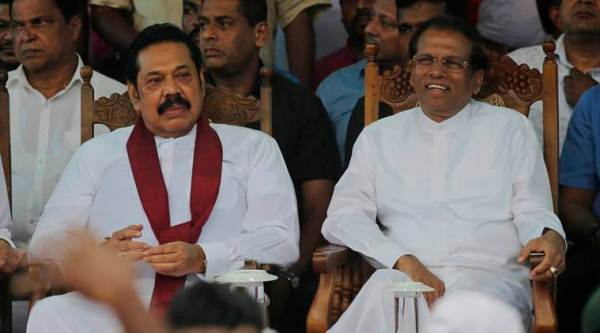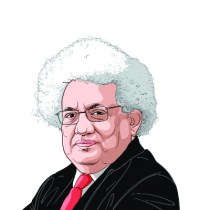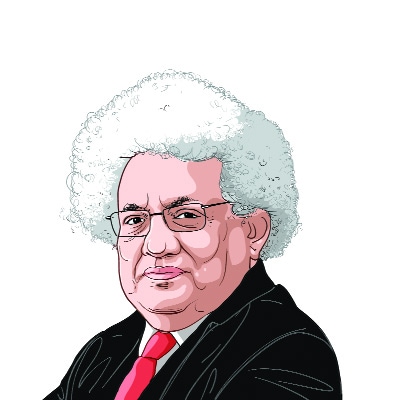Out of My Mind: Lanka Dahan
One of the problems of Sri Lanka is that while it has a high Human Development score, it is divided.

Rajapaksa was named PM by Sirisena last month. (PTI Photo)
The events in Sri Lanka are unprecedented. We can call it a Constitutional crisis. First, President Maithripala Sirisena dismisses Prime Minister Ranil Wickramasinghe, who was his choice. Then he installs as Prime Minister Mahinda Rajapaksa, the former President and someone whom Sirisena had defeated in the most recent election.
Sirisena realised that Wickramasinghe was popular, so he dissolved Parliament but the Supreme Court ruled it illegal. Sirisena still did not want to call Parliament. The Speaker refused to obey. The outgoing Prime Minister knew he could win a vote of confidence and Rajapaksa could not win. Then Sirisena promised elections in January. Parliament was summoned by the Speaker. Rajapaksa lost the confidence vote.
Such a succession of events would be impossible in India. For one thing, the President in India does not have executive power and has to act on the advice of the Prime Minister and Cabinet. India was also lucky in having a liberal democrat as its First Prime Minister who also enjoyed the longest continuous term in office and made the constitutional arrangement deep-rooted. Sri Lanka, which had a Constitution like India’s, changed it to one more like the French Constitution, where the President chooses the Prime Minister who has to command confidence of Parliament. But there is no way to remove the President.
The President has, however, lost legitimacy. Since Ranil Wickramasinghe won the confidence vote, he is the legitimate Prime Minister. The President’s dismissal of the Prime Minister is a political party feud. It is likely to be complicated by old family feuds.
One of the problems of Sri Lanka is that while it has a high Human Development score, it is divided. Unlike India, it did not have a mass movement for independence. The elite who came to power were highly anglicised. Early political leaders came from 10 prominent landowning families known as Goyagama. Most were British-style conservatives educated at Oxford. But Solomon Bandaranaike who became Prime Minister in the mid-Fifties was left-wing. He turned Ceylon into Sri Lanka, from a secular to a Buddhist state. He made Sinhala the principal language and downgraded Tamil. The Tamil minority felt threatened and deprived of their rights. A movement emerged for establishing a Tamil nation. Twenty-five years of civil war followed. Mahinda Rajapaksa was the ruthless President who finally vanquished the Tamil rebellion.
There is no knowing how the crisis would resolve itself. For a country which has been perhaps the most violent in South Asia, one can only hope that resolution would be peaceful. But a peaceful outcome would be unlikely. South Asia has been the home of religions preaching nonviolence but its politics has been very violent. There have been regional disputes, competing nationhoods as well as communal conflicts. Or just plain, mindless violence.
Liaquat Ali Khan, Pakistan’s first Prime Minister, was assassinated, as was Benazir Bhutto. Her father Zulfiqar Ali Bhutto was hanged and Zia-ul-Haq died when his plane was booby trapped and crashed. India lost Indira Gandhi to Khalistanis and Rajiv Gandhi was violently killed by Sri Lankan Tamil terrorists. Sri Lanka lost Solomon Bandaranaike to an assassination and later, President Premadasa who was the first political leader to come from outside the Goyagama elite. Bangladesh lost Mujibur Rahman.
Let us hope no more.
For all the latest Opinion News, download Indian Express App
More From Meghnad Desai
- Out of my mind: Beware of friendsEven the destruction of the Babri Masjid happened 26 years ago. What is the urgency now? When the Supreme Court scheduled the hearing in January…
- Out of My Mind: The leadership principleThe successes in 1937 and 1946 elections established the hegemony of the Congress, which Jawaharlal Nehru was able to strengthen by winning the first three…
- Out of my Mind: Lawless lawmenThe most encouraging aspect of the Khashoggi story is that a single honest journalist was seen as a threat by the Saudi regime. ..








































No hay comentarios:
Publicar un comentario